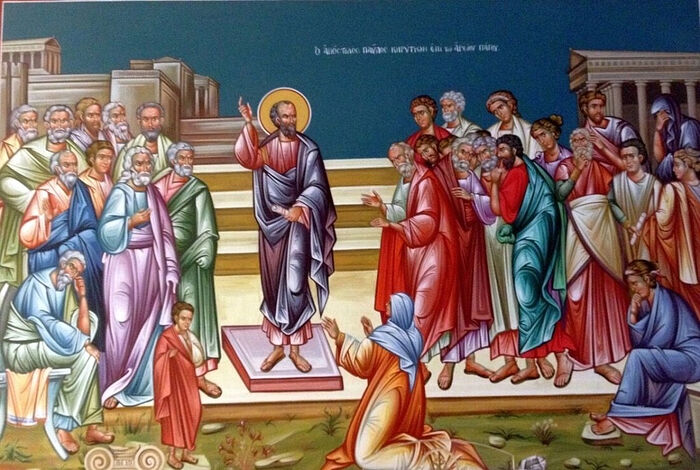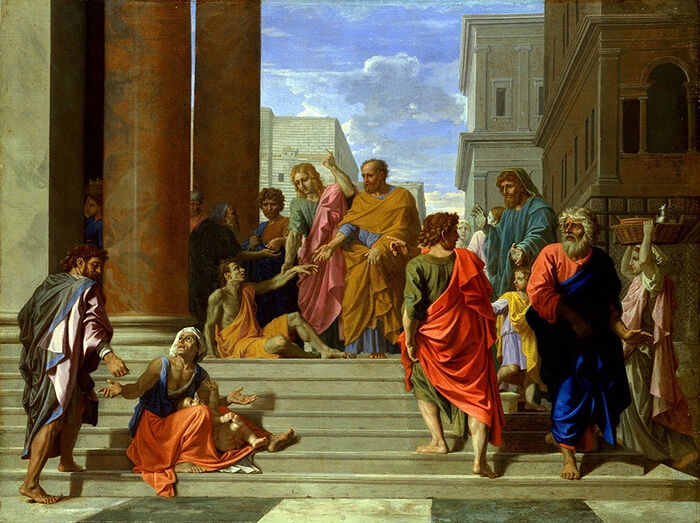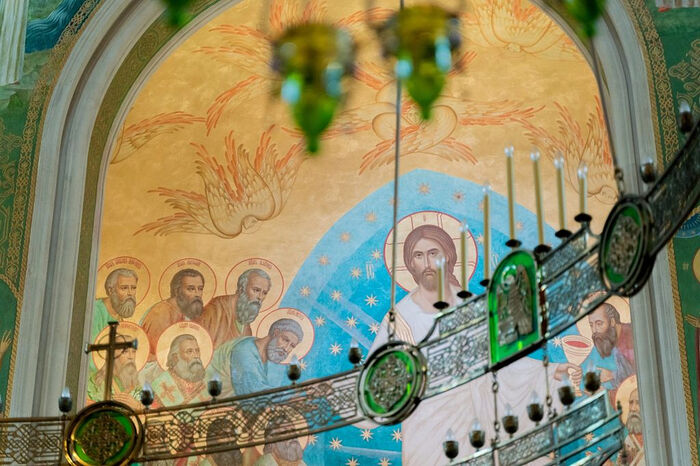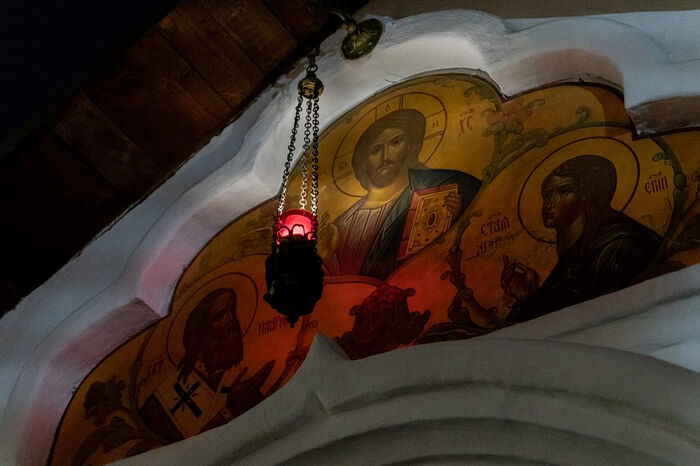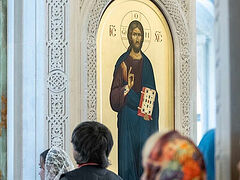We continue our talks on the Book of Acts with Sergei Komarov, a well-known catechist based in Moscow.
Friends, we continue our talks on the book of the Acts of the Holy Apostles, the third chapter.
Let’s read the sermon of the Apostle Peter. He gave his first one on Pentecost, and this is the second, where St. Peter uses a miracle to speak with the people, to give a sermon. This is a missionary, apostolic principle: first deeds, then preaching.
Let’s begin with the twelfth verse:
3:12 And when Peter saw it (that the people came running), he answered unto the people, Ye men of Israel (remember, this is how he began his first sermon as well), why marvel ye at this? or why look ye so earnestly on us, as though by our own power or holiness we had made this man to walk?
The ancient world had a belief (and the modern Church consciousness isn’t devoid of this either, by the way) that a pious man (the word “pious” is used only once in the New Testament here) that is, one who pleases God, living according to the commandments, fearing God, as if God were his debtor. God will fulfill his request, act according to his will, and help, if the man’s will is good.
This consciousness also exists today. The Bible says that the prayers of the righteous can do much (Jas. 5:16). And we see indications in the Bible that it’s pleasing to God for the righteous to pray for someone. There’s a story like this about Abraham, for example, or about Job.
Does God fulfill the prayer of the righteous because it’s some spiritual mechanism, or because He has to? Of course, God doesn’t owe anyone anything. The answer to this question is found in the field of relations with God. For example, a man asks a loved one about something and he helps. It doesn’t mean someone owes someone. It’s just love.
There’s no magic here—it’s a familial relationship, if you like. When a man is close to God, he has boldness before Him.
I’ll give you an example. Let’s say there’s an important, honored bishop. Can a stranger approach the bishop and ask him something? He can. But if this stranger asks for help from the bishop’s cell attendant, who has been with the bishop for ten or fifteen years, who knows him inside and out—they’ve eaten a pound of salt together1—then of course things will go faster. Vladyka will listen to his cell attendant, because it’s someone close to him asking. Although, of course, the bishop loves everyone in general.
The prayer of a righteous man—a man close to God—works the same way. God hears everyone—but He fulfills the request of a righteous man, because he’s close to Him.
Then St. Peter says that the Apostles did this not by their own power, and he explains: The God of Abraham, and of Isaac, and of Jacob, the God of our fathers (3:13). What do you think—why did St. Peter introduce such a long formulation: The God of Abraham, and of Isaac, and of Jacob, the God of our fathers? Because he was preaching for the Jews. St. Peter connects, as it were, the Jewish people’s past with their present. He shows that the Jews standing before him are the sons of promise—the same promise that was given to the forefathers.
Thus: The God of Abraham, and of Isaac, and of Jacob, the God of our fathers, hath glorified His Son Jesus.
Then comes the reproach that the Jews betrayed the Messiah. The same thing was heard in St. Peter’s first homily as well. Here he emphasizes that Christ is God. And he offers a way out of this situation—repentance. The scheme of the homily is the same, but it’s delivered somewhat differently.
Thus: The God of Abraham, and of Isaac, and of Jacob, the God of our fathers, hath glorified His Son Jesus; Whom ye delivered up, and denied Him in the presence of Pilate, when he was determined to let Him go (Acts 3:13)—a slight accent on Pilate’s seeming innocence and a rebuke of the Jews. Interestingly, the Ethiopian church venerates Pilate among the saints and commemorates him together with his wife. Supposedly he later became a follower of Christ. But I think the answer to our question of where these verses came from is different: The Apostle Luke writes for the Gentiles, so he seems to be trying to whitewash the pagan authorities a bit and reproach the Jews more.
You can roll this in different directions: The Jews are to blame in their own way, and the Roman authorities in their own way. Pilate gave official sanction to the execution, and the Jews led Christ to Pilate and accused Him.
3:14 But ye denied the Holy One and the Just, and desired a murderer to be granted unto you;
3:15 And killed the Prince of life.
There are several Messianic titles for Christ here: “Holy One and Just,” and, “Prince of Life.” The Greek word translated as “Prince” can be translated as the “Source” of life or as “Chief/Leader.” These two translations come together to make one meaning: Christ is the Source of life, because He’s God. Christ is the Prince of life—new life.
This is how the Apostle Paul speaks of Him in the Epistle to the Hebrews: The Captain of their salvation [was made] perfect through sufferings (Heb. 2:10). Christ is the Captain of salvation. In another place He’s called the “Forerunner.” It’s interesting that we call St. John the Baptist the “Forerunner,” but the word “Forerunner” is used in the Bible to refer to Christ, not to St. John. Christ is called Forerunner in the Epistle to Hebrews: Whither the Forerunner is for us entered, even Jesus (Heb. 6:20), writes the Apostle Paul about the entrance of Christ into the Heavenly Tabernacle. A forerunner is he who goes before the face of others, and all the others follow him. Christ is the Forerunner, and the Church calls St. John the Forerunner, although this word isn’t used in reference to St. John in the Bible.
Thus, Christ is the Prince of life, the Source of Life, the Captain of life, the Guide, the Leader of salvation.
3:15 God hath raised [Him] from the dead; whereof we are witnesses.
If in his first sermon, the Apostle Peter only cited the testimony of the Prophets about the Resurrection of Christ, then here he boldly says: We are witnesses. This is, if you will, the main message of the Apostolic preaching, as it were, in two parts: In the first, Christ is risen, and in the second—we are witnesses. This was the value of the Apostles—they saw the risen Christ and bore testimony to Him.
3:16 And His [Christ’s] name through faith in His name hath made this man strong, this blind man.
Again, the theme of name-worshiping: The name of Christ strengthened this sick man—that is, the grace of God, acting through the name of Christ. … Through faith in His name. “In His name”—who is this? In Christ’s name, or that of the sick man? Faith in general from whom? From man or God? Can man believe in something by himself? Why can’t he simply believe in God by himself?
God Himself creates a precedent of faith in Him by the fact of His existence. In this respect, faith is from God. If He didn’t exist and didn’t act in the world, we wouldn’t be able to believe in Him. Therefore, they say that the desire for faith comes from us, and faith comes from God.
But on the other hand, there are the concepts of prevenient grace and ecclesiastical grace. Theologians conditionally divide grace into prevenient and ecclesiastical. Prevenient grace is when a man is drawn to God, to prayer, to church; when he’s drawn by some religious feeling. As the Gospel of John says, God lighteth every man that cometh into the world (Jn. 1:9). But there is also ecclesiastical grace, which a man receives from the Church, from the Sacraments—this is a different quality of communion with God. There’s a fine line here: From man comes the desire, from God the faith. But God initially evokes in man the desire for faith by the fact that He exists.
3:16 And His name through faith in His name hath made this man strong, whom ye see and know: yea, the faith which is by Him (again, the Divinity of Christ is emphasized) hath given him this perfect soundness in the presence of you all.
3:17 And now, brethren, I wot that through ignorance ye did it, as did also your rulers.
This is justification number one from the Jews. Then comes the second:
3:18 But those things, which God before had shewed by the mouth of all His prophets, that Christ should suffer, He hath so fulfilled.
Here St. Peter pressed them a little bit, and then justified them somewhat, cutting them some slack. The first thought: You did it out of ignorance. In jurisprudence, ignorance is a mitigating factor. Yes, ignorance of the law doesn’t free you from responsibility; but still, crimes of ignorance are assessed differently than those committed intentionally.
And the second thought: It happened according to the prophecies, as foretold by God. St. Peter loves these words: “foretold,” “foreknowledge.” As in his first homily: Him, being delivered by the determinate counsel and foreknowledge of God, ye have taken, and by wicked hands have crucified and slain (Acts 2:23). St. Peter constantly reminds us of a certain providence of God. What is it?
Should we think that there’s some kind of divinely-written program of our lives that you’ll follow whether you want to or not? No. God predestines because He knows in advance. His foreordaining is based on foreknowledge. God doesn’t determine a man—man is free. But there are qualifications. Man is free, relatively speaking, within the matrix of the providence of God. He is absolutely free, but God has foreseen his actions and therefore predetermined them in advance. It’s impossible to understand—don’t even try. On the one hand, man is free, but on the other—everything’s predetermined. God simply sees ahead. He doesn’t unconditionally predestine, but according to His foreknowledge.
Even we have small opportunities to predetermine in the sense of foreseeing. We can calculate something in advance with some degree of likelihood. Blessed Theodoret of Cyrus gives an example: When we see a rabid horse galloping towards a cliff, we know for sure that he’ll fall over the edge in a minute. Are we pushing this horse? No. Are we tossing him into the abyss? No, we just know ahead of time. Now compare our miniscule human knowledge with the omniscience of God. God knows everything in advance. For God, time is just a point. He sees everything ahead of time, and that’s why He predetermines. But at the same time, God interacts with man, leading him to salvation, even though He knows everything in advance.

